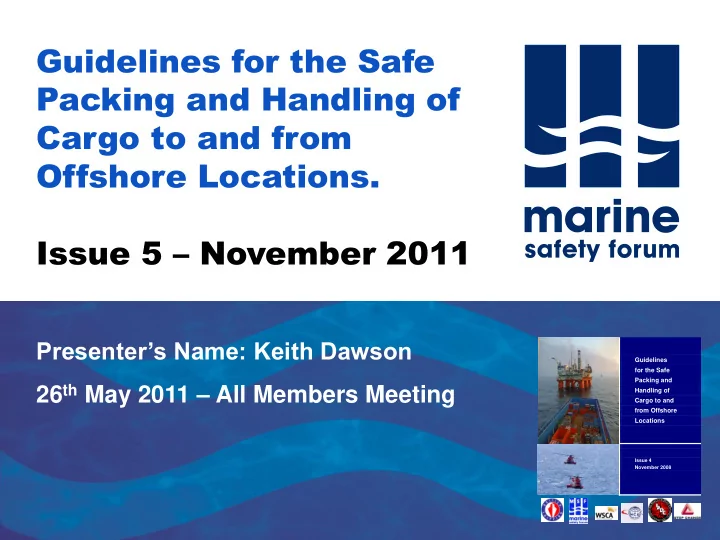

Guidelines for the Safe Packing and Handling of Cargo to and from Offshore Locations. Issue 5 – November 2011 Presenter’s Name: Keith Dawson Guidelines for the Safe Packing and 26 th May 2011 – All Members Meeting Handling of Cargo to and from Offshore Locations Issue 4 November 2008
Why it all started… • Ten years ago following discussion on an incident, which had resulted in a crew man being crushed, when a choke valve fell out of a container. • During the investigation it emerged that there was a need for commonality of working practices and standards to eliminate risk from cargo handling. • History – Developed through the Marine Safety Forum • A requirement for a widespread industry ‘best practice’ document. Issue No. 1 - May 2001 - UKOOA: Hard copy document Issue No. 2 - November 2002 - UKOOA: CD ROM Issue No. 3 - November 2005 - UKOOA: CD ROM Issue No. 4 - November 2008 - Oil & Gas UK: CD ROM Issue No. 5 - November 2011 - MSF: CD ROM, Pocket Handbook, Website?
Revision 5 • The reasons behind the original concept still exist so the workgroup has reviewed the guidelines reflecting: - Changes in legislation - Improved industry practices - Lessons learnt from incident and accident reports. • We still need to know where the problems lie so that we can address them, and are therefore very dependent on receiving feedback or formal complaints from the vendors so that follow-up action can be taken. • This will enable us to learn from the occurrence, identify best practice and eliminate non conformance and the associated risk.
The workgroup is made up of the following companies • ASCO • Noble • Bp • Peterson SBS • Britannia • Shell • Baker Hughes • Sparrows • ConocoPhillips • Talisman Energy • Maersk • Total • Nexen • Weatherford
Other contributors • Dominion Gas • Dangerous Goods Management • Swires • Ramco • Ferguson Seacabs • CCA • Conserve
Advantages of a common workgroup approach Incorporation of ‘BEST PRACTICE’ from all. Guidelines Leading to:- for the Safe Packing and Handling of • Increased Safety Cargo to and from Offshore • Faster sharing of lessons learned Locations • Common Industry approach • Reducing the risk of ‘getting it wrong’ Issue 4 November 2008
Supply Chain Responsibilities All parties must recognise that they have a responsibility to protect all staff working within the supply chain as well as members of the general public: • Vendors • Haulage contractors • Logistics service providers • Vessel operators • Aircraft operators • Offshore operators
Background Since the original document significant improvements have been realised across the industry, however we still have the following concerns: • Recurring safety issues (Dropped Objects & Snagging Hazards) • Inconsistent implementation of the guidelines. • Awareness and distribution of the guidelines • Costs and delays resulting from non-conforming cargo • Quality of outbound and inbound shipments
Remember this… Slide content here … OBJECT LANDED HERE
Revision 5: Focus areas • Raising the Profile of the • Training & Competence document -CD Rom -Dedicated training -Pocket version -General subject training -Dedicated website -In house training -Posters -E learning • Audit • Security -Demonstrate compliance -Addressing supply chain issues -Gap analysis -Recognising threats - Sharing ‘best practice’ concepts
Revision 5: Focus areas cont… • Container Standard BS 7072 - Some UK operators no longer accept BS7072 units -Some UK operators promising to phase out by 2012 -Denmark no longer accept BS 7072, in fact it is punishable by imprisonment. -Norway and Holland have indicated that they are looking to phase these units out by 2012 -Suppliers proposed timeframe - Somewhere in the region of a 5 - 7yr window (2016 – 2018) to allow the companies with a large stock of BS7072 units to phase them out and replace them. Marine Guidance Note 282 ‘ It should be noted that BS 7072 was withdrawn on 15 October 1999 and CTUs constructed to BS 7072 alone, may not comply fully with MSC/Circ.860 requirements. Therefore, CTUs that do not fully comply with MSC/Circ.860, built to BS 7072, may continue to be used, subject to them being maintained and surveyed in accordance with a recognized standard until 1 January 2015.’
Revision 5 update… • Tony Littler , Previous Chairman of the Guidelines for ten years, had the passion, drive and enthusiasm to ensure the industry had a ‘best practice’ document which is ‘fit for purpose.’ • The guidelines are now seen as industry ‘best practice’ and have been in circulation for 10 years, with four revisions now completed, and the fifth due November 2011. How often should revision take place? • The workgroups supporting the document, have consisted of over 20 oil operating and supported by a significant amount more contracting organisations. • Over 5000 people have attended roll out sessions in Aberdeen, Heysham & Great Yarmouth • These guidelines are not only used in the UK but around the globe ….
Revision 5 update… • North Western European Area (NWEA): - Guidelines for the Safe Management of Offshore Supply and Rig Move operations - Guidelines for the Safe Packing and Handling of Cargo to and from Offshore Locations. • Broaden the horizons of the document to include Netherlands, Norway and Denmark. (similar documents must exist in these countries) • Established companies involved in the guidelines with overseas assets, have an interest in expanding the document. • Overseas members of the MSF may wish to be involved. • We have a proven document, why not share it and draw on best practices from other areas? .
Any Questions …
Recommend
More recommend